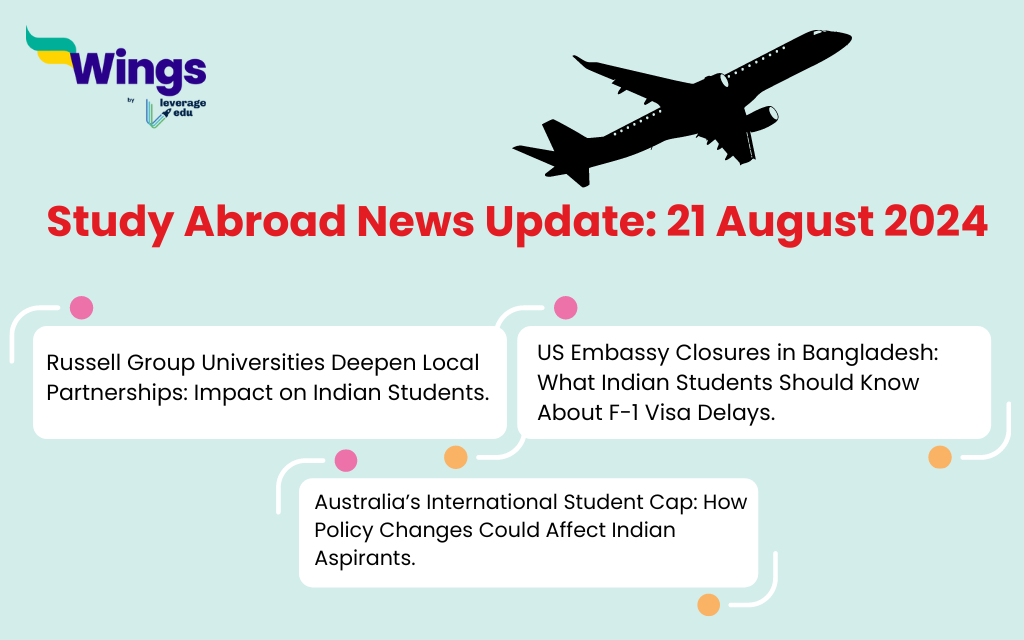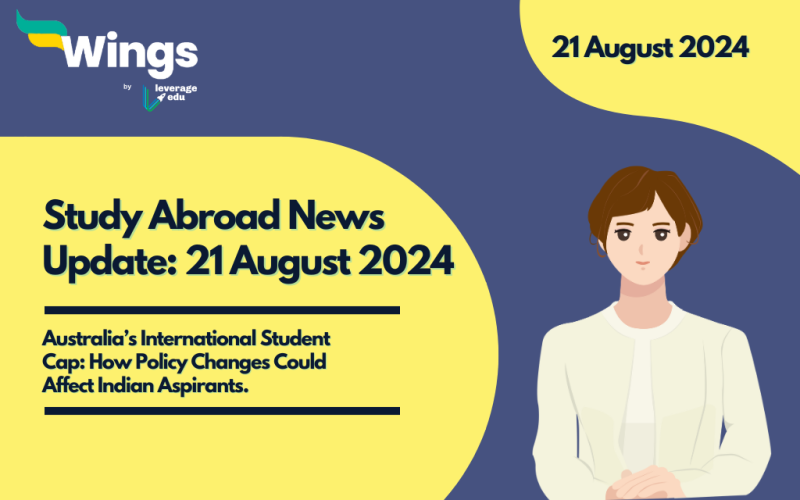Study Abroad News Updates for 21 August 2024: Keep yourself updated with the most important study abroad news updates for Indian students as of August 21, 2024. From visa changes to new university policies, our updates will help you stay on track with your plans to study abroad. These insights will guide you in making informed decisions, ensuring you move forward confidently in your journey toward an international education.
News Highlights: Study Abroad For Indian Students
Stay ahead of the curve with the latest news affecting Indian students planning to study abroad.

Our highlights cover essential policies, trends, and opportunities that can influence your global education experience. Whether you are researching visa requirements or searching for scholarships, these updates offer valuable information to guide your decisions.
| 1. UK universities are strengthening ties with local communities through research and innovation. Offers Indian students new opportunities to contribute to real-world solutions in fields like healthcare, digital inclusion, and sustainability. 2. US embassy shutdown in Bangladesh for student visa processing. Provides essential advice for Indian students on handling potential delays and alternate solutions for their own F-1 visa applications. 3. Australia’s proposed cap on international enrolments. The proposed cap guides Indian students in the evolving education environment. |
Essential Study Abroad News for Indian Students: Key Updates and Trends
If you are an Indian student aspiring to study abroad, staying informed is crucial. Our study abroad news section shares the latest opportunities, visa requirements, and practical tips to make your international education journey smoother.
Stay updated on what’s happening in the world of global education and be better prepared for your studies abroad.
| 1. Russell Group Universities: Local Contributions and Global Opportunities for Indian Students Russell Group universities, popular globally for their teaching and research excellence, are now emphasizing their local impact on regions through partnerships with schools, businesses, and communities. Their new report, “Places and People,” indicates how these universities are addressing local challenges, like health, digital skills, and Net Zero, by leveraging their research capabilities. For Indian students planning to study in the UK, this holds significant value. The focus on solving real-world problems means that students will have opportunities to engage in cutting-edge projects, internships, and community-based learning experiences that go beyond academic degrees. Programs in areas like digital innovation, climate action, and health research are growing rapidly in these institutions, opening up new pathways for students to gain hands-on experience in sectors critical to future careers. Take, for example, Queen’s University Belfast’s digital ICT qualification developed in collaboration with local communities. This initiative could attract Indian students interested in digital skills development, as it combines academic rigour with direct community engagement. Similarly, research on public health challenges by universities like Queen Mary University of London (QMUL) will allow Indian students, particularly those from similar cultural backgrounds, to contribute to important healthcare advancements. Moreover, the Russell Group’s commitment to Net Zero initiatives, as seen in Cambridge and Edinburgh, will provide Indian students interested in environmental studies, renewable energy, or AI-driven sustainability with unique learning experiences. In conclusion, the shift towards more community-centred research by Russell Group universities offers Indian students broader exposure, practical experience, and a chance to make a difference both locally and globally. These developments can positively impact career prospects, giving Indian students an edge in fields that address today’s pressing challenges. |
2. U.S. Embassy Closure in Bangladesh: Lessons for Indian Students The temporary closure of the U.S. embassy in Bangladesh due to civil unrest has led to severe delays for students awaiting F-1 visa interviews. As the embassy canceled thousands of appointments throughout July and August, Bangladeshi students have been forced to defer their enrolments or seek alternative solutions. While some have been redirected to the U.S. embassy in Kolkata, the process remains uncertain, with many students missing out on starting their academic year in the U.S. For Indian students, this serves as a valuable lesson in the importance of preparing for unforeseen circumstances when applying for a student visa. The U.S. remains a top destination for Indian students, and delays in visa processing due to political unrest or other factors can directly impact study plans. Indian students should consider applying for visas well in advance of deadlines and keep track of embassy updates. Furthermore, Indian students can also learn from the importance of having a contingency plan. In situations like these, contacting universities to explore options such as deferred enrolments, starting online courses, or even requesting expedited visa appointments becomes crucial. Many U.S. universities offer flexible options in such cases, but it’s essential to communicate with the institutions early. Students can also look into alternative visa processing locations or embassy interview waivers, as some U.S. embassies provide emergency slots in nearby countries. Understanding these options in advance will allow Indian students to navigate any disruptions and ensure they do not miss the start of their academic program. In conclusion, Indian students should take the embassy closures as a reminder to stay prepared, plan, and remain adaptable when pursuing their dreams of studying abroad. |
| 3. Australia’s International Student Policy Changes: What Indian Students Need to Know The Australian government’s recent proposal to cap international student enrolments has sparked concerns among universities with large overseas student populations. The University of Melbourne, for example, currently has around 46% of its student body made up of international students. Any changes to these enrolment policies could significantly affect Indian students planning to study in Australia. Australia has been a top destination for Indian students due to its quality education, welcoming environment, and post-study work opportunities. However, the introduction of a cap on international students may reduce the number of spots available at prestigious universities. This could make it more competitive for Indian students to secure admissions, particularly at institutions like the University of Melbourne, which has been a favorite for many due to its strong academic reputation and global connections. Additionally, visa processing times and changes in student migration policies are critical factors that could further complicate the situation. For Indian students, staying updated on these policy shifts is essential. Students should consider applying to a range of institutions, including those outside the more popular regions like Sydney and Melbourne, to increase their chances of acceptance. Exploring opportunities in regional universities may also offer added benefits, such as scholarships and work visas, which could make the study experience even more rewarding. While the proposed changes are yet to be fully implemented, the potential impact on future enrolments means Indian students must remain vigilant and proactive in their planning. Researching universities, preparing documents early, and understanding the visa process will be key strategies in navigating these evolving circumstances. In conclusion, Indian students should adapt to Australia’s changing policies by staying informed, exploring alternative institutions, and ensuring their application process is well-prepared to avoid any setbacks. |
Study Abroad Lingo: Your Guide to Key Terms and Phrases
| Word | Meaning | Sent |
| Host Institution | The college or university in a foreign country where a student is studying or enrolled. | The host institution provided excellent support services for international students, helping them adapt to life in a new country. |
| Home Country | The country where a student originally comes from, as opposed to the country where they are studying abroad. | Keeping in touch with friends and family in my home country has helped me feel less homesick while studying abroad. |
| Halls of Residence | Dormitory or housing provided by the university for students to live in while studying. | Living in the halls of residence made it easy to meet other international students and quickly adjust to my new environment. |
Exploring the world of international education can be confusing, but understanding the common terms will make it easier. In our user-friendly segment on study abroad lingo, we simplify key vocabulary.
Stay informed about the Study abroad news update with Leverage Edu News Desk and plan your journey with Leverage Edu today!


 One app for all your study abroad needs
One app for all your study abroad needs












 60,000+ students trusted us with their dreams. Take the first step today!
60,000+ students trusted us with their dreams. Take the first step today!